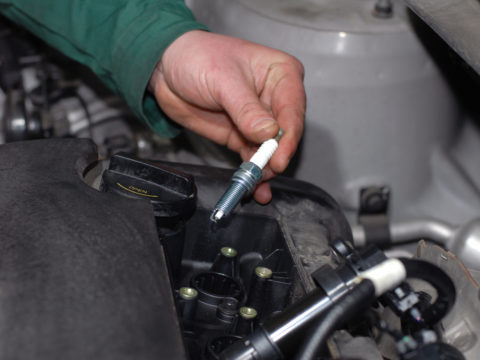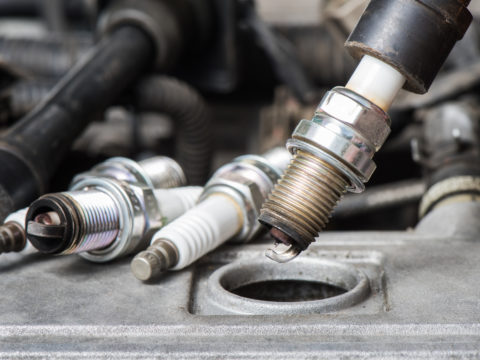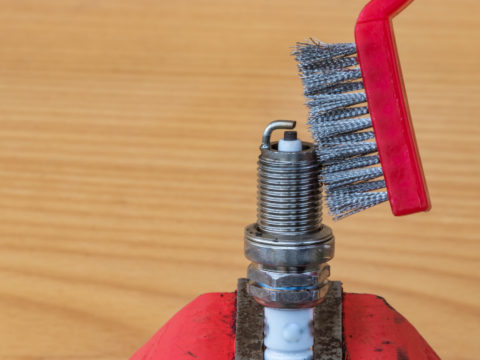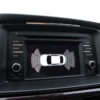
Contents
XC12YC Overview
The Champion 982 XC12YC is a nickel spark plug designed for gasoline-powered engines. The spark plug features a 14mm thread diameter, a 19mm reach, and a 5/8″ hex size for installation. Its recommended gap size is 0.030 inches (0.75 mm).
It has a heat range rating of 12, designed to operate at a medium temperature range, with a copper core electrode for good conductivity and heat dissipation to ensure reliable ignition and combustion.
The XC12YC spark plug’s nickel alloy electrodes provide good resistance to wear and corrosion, which helps to maintain consistent performance over the life of the spark plug.
What is an XC12YC spark plug used for?
It is compatible with small gasoline engines used in lawnmowers, generators, and other outdoor power equipment.
RC12YC Overview
The Champion RC12YC spark plug is a copper-core spark plug.
The “RC” in the part number stands for resistor and copper, which refers to the construction of the spark plug. The resistor helps to suppress radio frequency interference (RFI) that can affect electronic equipment.
At the same time, the copper core center electrode provides better conductivity and heat control than other spark plugs.
The Champion RC12YC spark plug features a multi-ribbed insulator that helps prevent flashover and a tapered cut ground electrode that helps improve ignitability and fuel efficiency.
The plug also features a nickel alloy center electrode, providing longer life and excellent durability.
What is the Champion RC12YC spark plug used for?
The Champion RC12YC spark plug works with more modern small and automotive engines that require more stringent resistor protection.
Similarities
The RC12YC and XC12YC spark plugs share several similarities, including:
- Shell Design: The RC12YC and XC12YC spark plugs feature a standard 14mm thread, a flat seat with a gasket, and a projected nose.
- Heat Range: 12, suitable for automotive and small engine
- Ground Electrode Material: Copper
- Hex Size: ⅝” (16mm)
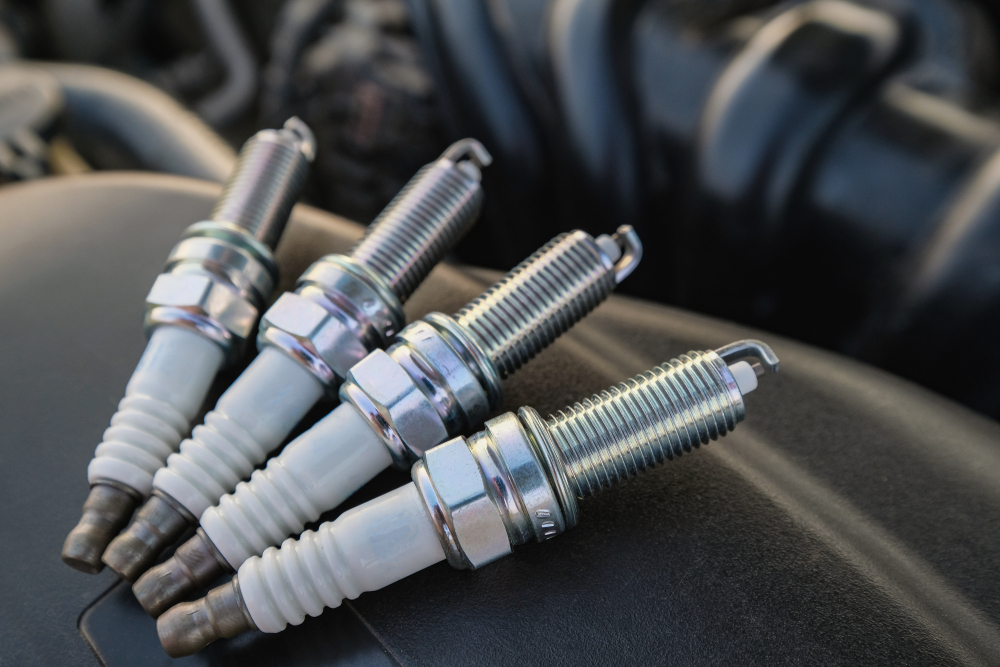
Differences
Both spark plugs are high-quality products for reliable ignition and long service life.
However, some critical differences may or may not make them suitable for your specific engine.
Resistor
A resistor on a spark plug is an electrical component that reduces electromagnetic interference (EMI) created during the spark ignition process.
Champion spark plugs featuring an “R” type resistor– such as the RC12YC– typically use Champion SAC-9 suppressors. These highly dependable resistors are made using a combination of strontium carbonate, aluminum oxide, and copper oxide powders.
While SAC-9 suppressors effectively counter common radio frequency interference (RFI), their resistance cannot be precisely measured using standard low voltage ohmmeters. The RC12YC is rated at 6-15 kilohm, meaning the internal resistor has a resistance value between 6,000 and 15,000 ohms.
On the other hand, the XC12YC has combined resistive/inductor suppression and meets much stricter RFI requirements.
A dual resistor-suppressor spark plug design incorporates two different types of resistors to reduce radio frequency interference (RFI) and electromagnetic interference (EMI) generated by the ignition system.
By incorporating both types of resistors into the spark plug design, a dual resistor-suppressor spark plug can provide more effective suppression of RFI and EMI than a single resistor spark plug.
The dual resistor-suppressor spark plug design is commonly used in modern vehicles with more complex electronic systems sensitive to RFI and EMI.
Price
On the official Champion website, the RC12YC retails for $3.41, while the XC12YC is slightly more expensive, at $4.44.
Gap
The size of the spark plug gap can affect the engine’s performance.
A more significant gap creates a bigger spark, which can improve combustion efficiency and power output. However, if the gap is too large, the spark may need to be stronger to ignite the air/fuel mixture, leading to misfires and poor engine performance.
On the other hand, a smaller gap provides a stronger spark, but it may not be large enough to properly ignite the air/fuel mixture, leading to incomplete combustion and poor performance.
The RC12YC has a 0.035″ gap, larger than the 0.030″ gap on the XC12YC.
Warranty
Champion offers a lifetime warranty on the XC12YC, while the RC12YC only has a 2-year warranty.
Engine Brand Compatibility
Because different spark plug brands manufacture the same fundamental part, you can swap out which specific brand you use in your engine.
The XC12YC is interchangeable with 11 brands, including:
- Accel
- Autolite
- Beru
- Bosch
- Brisk
- Denso
- Fiat
- Kohler
- Magneti Marelli
- Mitsubishi
- Toyota
On the other hand, the RC12YC is interchangeable with 38 brands, some of which include:
- Beck Arnley
- Beru
- Bosch
- Briggs & Stratton
- Brisk
- CUB
- Denso
- E3
- Honda
- Iskra
- Jaguar
- LD
- Magneti Marelli
- Motorcraft
- Torch
Summary Table
| XC12YC | RC12YC |
| SAC-9 resistor | Combined resistive/inductor suppression |
| Retails for $4.44 | Retails for $3.49 |
| 0.030 inch (0.75mm) gap | 0.035 inch (0.9mm) gap |
| Lifetime warranty | 2-year warranty |
| Limited interchangeability across 11 brands | Much higher interchangeability across 38 brands |
Can you use XC12YC instead of RC12YC?
No, you cannot use XC12YC instead of RC12YC.
Spark plug resistor types are designed to operate within a specific range of operating conditions, and you cannot use them interchangeably without potentially affecting engine performance and reliability.
Suppose you use a spark plug with a different resistor type than what is recommended by the engine manufacturer.
In that case, the spark plug may not provide sufficient resistance to radio frequency interference (RFI) and electromagnetic interference (EMI) from the engine, leading to misfires, reduced fuel efficiency, and other engine problems.
Additionally, the incorrect spark plug resistor type can cause problems with ignition timing, leading to engine knock and other issues.
So, Which Is the Best Spark Plug for Your Vehicle?
The best spark plug for your vehicle depends on various factors, including the make and model of your vehicle, the type of engine it has, and your driving habits and conditions.
Spark plugs are a critical component of a gasoline-powered engine’s ignition system, providing the electrical spark that ignites the fuel-air mixture in the engine’s cylinders.
Many types of spark plugs are available on the market, and they differ in several ways, including the materials used, electrode design, heat range, and resistance rating.
These differences can affect the engine’s performance, efficiency, and reliability. Choosing the right spark plug for your specific engine and driving conditions ensures optimal performance and avoids potential issues.
Here are some general considerations to keep in mind when selecting a spark plug:
- Follow the manufacturer’s recommendations: The best way to ensure you select the correct spark plug for your vehicle is to consult the owner’s manual or contact the manufacturer directly. They typically recommend the best spark plug based on your vehicle’s make, model, and engine type.
- Choose the proper heat range: Spark plugs are designed to operate within a specific temperature range. Using a spark plug with the wrong heat range can cause problems such as fouling, overheating, or pre-ignition. Your vehicle’s manufacturer can recommend the appropriate heat range for your engine.
- Consider the type of electrode: There are different types of electrode materials used in spark plugs, including copper, nickel, platinum, and iridium. These materials have specific properties that may affect the performance and lifespan of the spark plug.
- Check the gap size: The gap size of a spark plug affects the spark intensity and ignition timing. Ensuring that the gap size is within the recommended range for your engine is vital.
- Consider the brand reputation: There are many different brands of spark plugs on the market, each with its reputation for quality and performance. Researching and selecting a reputable brand can ensure you get a high-quality spark plug for your vehicle.
Alternatives
If the RC12YC or XC12YC spark plugs are unavailable or unsuitable for your engine, you can replace them with alternative spark plugs.
However, note that the specific spark plug replacement will depend on factors such as the engine manufacturer, the application, and the operating conditions.
NGK BPR5ES
This spark plug is a standard replacement for the XC12YC spark plugs in small engines, such as lawnmowers, generators, and other outdoor power equipment.
Bosch FR8DC
The FR8DC is a standard copper core spark plug with a 14mm thread diameter, a 19mm reach, and a 5/8″ hex size. It has a recommended gap size of 0.032 inches (0.8mm) and is suitable for many gasoline-powered engines, including cars, trucks, and motorcycles.
Motorcraft SP-432
If you need a more significant gap size, the Motorcraft SP-432 platinum-tipped spark plug has similar dimensions to the RC12YC and XC12YC but with a recommended gap size of 0.050 inches (1.27mm).

